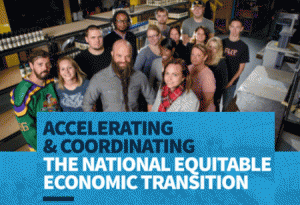Press Release by Dan Radmacher (dan@appvoices.org), Appalachian Voices, April 18, 2022
APPALACHIA — Today, dozens of Appalachian organizations and national partners submitted a letter to President Joe Biden, U.S. Speaker of the House Nancy Pelosi and Senate Majority Leader Chuck Schumer urging them to make sure that a budget reconciliation package under negotiation in Congress targets climate action spending in ways that help communities in coal-impacted Appalachia and elsewhere benefit from the transition to a clean-energy economy.
“The decline of the coal industry in Appalachia has left many communities in the region grappling with unemployment, low income levels, black lung disease and environmental degradation,” said the letter, which was signed by 71 Appalachian groups and seven national organizations. “The transition to a clean energy economy must be centered around justice and equity for all Americans and support communities that have historically been hit hardest by the fossil fuel industry and its decline.”
U.S. Sen. Joe Manchin, whose opposition halted negotiations on last year’s Build Back Better Act, has said he would support a smaller budget reconciliation package that would include $555 billion in clean energy investments to help the United States reach its carbon reduction goals. The groups urged Congress to ensure these investments helped former coal communities and others impacted by the clean energy transition transform their economies.
“President Biden promised bold action on climate, while lifting up the fossil-fuel impacted communities that have struggled the most,” said Tom Cormons, Executive Director of Appalachian Voices. “Now is the time for Congress to fulfill that promise, creating jobs and helping to bring on a brighter economic future in places where action is deeply and urgently needed. That means getting this legislation to the finish line.”
“Our company is creating jobs in Southwest Virginia and West Virginia coal communities as we develop solar projects and savings for public schools and other public serving institutions,” said Dr. Tony Smith, President and Founder of Secure Futures, LLC, a Virginia-based certified B-Corp solar development company. “We are coping with huge uncertainties and volatility in the supply chain and the loss of U.S. solar manufacturing capacity as we build solar arrays that will generate savings for 35 years and permanent jobs in coal communities. We remain concerned that there is a narrow window of opportunity to act on this much needed legislation to sustain that momentum.”
“Virginia’s coalfield region has great potential to become a clean energy hub while protecting our beautiful local natural resources,” said Sharon Fisher, President of The Clinch Coalition in southwestern Virginia. “We need Congress to act now to address climate change while supporting the communities that are grappling with the decline of coal and its health and environmental impacts.”
“Right now, our region faces unprecedented challenges – but we also have an incredible opportunity,” said Dana Kuhnline, ReImagine Appalachia Campaign Manager. “We have a once-in-a-generation chance to respond to the climate crisis while repairing our nation’s infrastructure, cleaning up dangerous pollution, investing in working families and jumpstarting our clean energy future. Federal investment in our infrastructure, built by our region’s skilled workforce who can pivot to help us build the future we want, can position Appalachia to once again become a global powerhouse while creating a blue collar union jobs bonanza.”
“In no part of the country is the passage of a pro-worker, pro-family reconciliation package more important than West Virginia and Appalachia,” said Kelly Allen, Executive Director, WV Center on Budget and Policy. “In order to provide a path forward for our region, we must address climate change by investing in clean energy and lower costs for workers and families by continuing health care and child care improvements made in the American Rescue Plan Act. Best of all we can pay for these investments and more by rolling back the inequitable 2017 tax cuts so that the richest Americans and corporations, who’ve seen their wealth soar over the past two years, pay their fair share in taxes.”
“I want to live in a West Virginia where young people don’t have to move away from the state they love to find opportunities,” said Holly Bradley, WV Organizer for Chesapeake Climate Action Network. “West Virginians are resilient, hardworking and we’ve learned to be adaptable because we didn’t have another choice. I wish for our elected officials to listen to our people, find common ground and ensure that our state does not get left in the literal coal dust as the rest of the nation transitions to renewable energy.”
“These unprecedented investments would mean so much for working families in West Virginia,” said Angie Rosser, executive director of West Virginia Rivers Coalition. “Families that have sacrificed so much in the past to help power this nation deserve to prosper from the transition to clean energy rather than have their needs forgotten yet again.”
“We cannot afford to miss this opportunity,” the groups wrote in the letter. “Please act immediately to move forward on a legislative package that includes the $555 billion clean energy jobs and climate plan that will help transform coal-impacted Appalachia.”

